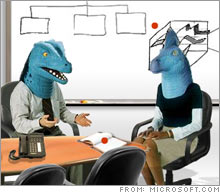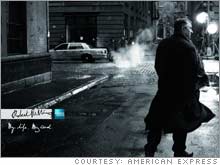|
Big-name brands in "Hall of Shame"
Microsoft, Wal-Mart, Ford and Gap among the iconic American brands that committed a marketing blooper in '05. Plus: Who's getting it right.
NEW YORK (CNNMoney.com) - Microsoft, Wal-Mart, Ford and Gap -- four of the top iconic American brands -- have one other attribute in common: They each blew it in 2005 when it came to getting out their message. "There's never been a year where so many market leaders struggled with their marketing message," said Kelly O'Keefe, an independent branding consultant and CEO of O'Keefe Brands.
O'Keefe has published an annual branding "Hall of Shame" for four consecutive years. He has not published an official list for 2005, but these four companies would rank high, he said. "When you look at who's had branding bloopers recently, it's those companies that have been struggling to grow profits. They're attempting to break into new markets and making mistakes along the way," said Robert Passikoff, branding expert with Brand Keys Consulting. What were they thinking?
Microsoft Is Microsoft (Research) calling its own customers "dinosaurheads?" The idea behind Microsoft's ads that feature office workers with heads of a dinosaur is to tell the company's business customers that's it's time to upgrade or risk missing out on new features and benefits. "It's sophomoric and it doesn't work," said O'Keefe. "Microsoft is demeaning its own customers who are already using its products by implying they're dinosaurheads if they don't upgrade quickly." Wal-Mart The giant retailer has been on O'Keefe's bloopers list a few times. Wal-Mart's attempt to tweak its merchandise and marketing mix to appeal to an more upscale consumer is a mistake, he said, adding that Wal-Mart's Christmas ads this past holiday featuring singer Beyonce at home with her family opening gifts were a bad idea. "Beyonce doesn't speak to Wal-Mart's core customers," he said. "Wal-Mart's always been about low prices. Instead of trying to be someone who they're not, Wal-Mart should refocus on who they once were to the customer, which was a no-frills provider of products at great prices and friendly service." O'Keefe's other gripe is about the disappearance of "Mr. Smiley" from Wal-Mart's ads. "The smiley face wasn't only about low prices but it became a symbol of Wal-Mart (Research)." Ford The automaker made a tremendous marketing blunder last year when the company pulled ads of some luxury brands from Advocate magazine, a publication that caters to the gay community, because of pressure from a conservative Christian group. Said O'Keefe, "This in itself would have a big negative impact on the gay community. But what's worse is Ford (Research) flip-flopped and decided to put the ads back. So Ford essentially risked alienating potential customers on both sides of the issue." Ford's recent marketing message focuses on emphasizing innovation at the company while earlier it said it stood for quality. "Consumers are confused. Is it innovation or is it quality?" O'Keefe said. Passikoff said Ford's rival General Motors (Research) should be in the "Hall of Shame," too. "The most important aspect of branding is to stand for something unique in consumers' minds. GM isn't branding anymore but commoditizing," Passikoff said. "This is antithetical to branding. GM's brands don't stand for anything so the last resort is to commoditize the product and sell on price." The Gap O'Keefe said Gap (Research)'s decision not to advertise the Gap brand on television over the holidays was a blooper. "Even though TV is eroding in terms of customer value, it's still a part of the overall advertising mix." Who's getting it right
Motorola (Research) has successfully revived its once struggling brand image, O'Keefe said. "The Razr phone is at the head of its effort. The company is doing a great job in changing the look and feel of the brand." He applauds American Express (Research)' "My Life. My Card" campaign which features well-known celebrities such as Robert de Niro and Ellen DeGeneres talking about the role of the brand in their lives. "One thing we look for in great brands is how they maintain long-term consistency of the image, said O'Keefe. "With the new campaign, American Express is once again promoting the concept that the brand isn't a commodity but rather that those who use it belong to an exclusive club." Office supplies chain Staples (Research) also gets a thumbs-up. "When they came out with their "That was easy" tagline, we didn't know if it was simply cute or if they really meant it. But I think they've proved to customers that they do mean it and they're serious about making the shopping experience easier by being innovative. They offer an online rebate program and the company's using customer suggestions to create new products," O'Keefe said. ----------------------------- Olsen twins pitch new clothing line to Wal-Mart. Click here for more. Storm rooms coming to a chain near you. Click here for more. China: Your company name may not be yours. Click here for more.
"Made in U.S.A" back in vogue? Click here for more. |
|



